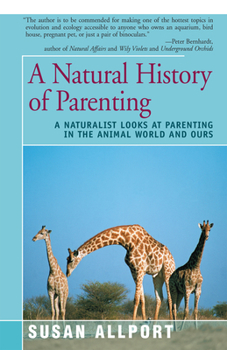A Natural History of Parenting: A Naturalist Looks at Parenting in the Animal World and Ours
Select Format
Select Condition 
Book Overview
"We humans parent our young longer than any other animal on earth. For us, parenting is such an essential part of reproduction that we tend to think of parenting as an essential part of all... This description may be from another edition of this product.
Format:Paperback
Language:English
ISBN:1504034228
ISBN13:9781504034227
Release Date:September 2016
Publisher:Open Road Integrated Media LLC
Length:256 Pages
Weight:0.87 lbs.
Dimensions:0.6" x 5.0" x 8.0"
Customer Reviews
5 ratings
Intriguing look into both parenting and nature
Published by Thriftbooks.com User , 19 years ago
Naturalist Susan Allport takes a look at parenting in all animals, humans included, from a genetic evolutionary perspective. She discusses the different strategies animals have for choosing a mate, choosing a nest, hatching eggs versus bearing live young, and rearing their young. With every stage of exploration, she includes a discussion of how humans fit into this complex world. The Good and the Bad: This was a very good book, and I'm considering it as a present for parents I know. One of the nice things about this book is that Allport manages to insert her own experiences into the book without seeming egotistical. I'm not sure whether women have a special talent for this, or whether my own male ego is offended by the intrusions of other male egos into my reading material, but I definitely notice a gender trend with regards to that quality of nature writing. Allport manages to touch on a lot of interesting material in detail, with only a slight tendency towards dryness. She mixes in a good amount of interesting examples with her discussion of selfish gene theories. In my option, though, she may not have had to take us through the evolution of scientific thinking, and I would have rather had the information confined to what we think now. The sole exception to this reservation is when she is talking about how a flawed scientific study was the basis for a revolution in birthing practices in hospitals in England and around the world. What I learned: So much information was crammed into this book that it's too much to provide all of the examples that are interesting. But a few standouts include: almost every aspect of parenting behavior has the purpose of reproducing the genes of the parent, whether this means selfless devotion to the young, or the abandonment of an offspring, to that offspring's fatal detriment. This is true both of behavior and physiology. Humans have evolved to give "premature" birth to an undeveloped baby with an amazing capacity for development and learning.
We are animals too!
Published by Thriftbooks.com User , 23 years ago
This fun insightful book began with the author's seemingly simply query based on something she witnessed on her own farm: Why did a ewe walk away from the lamb she had just given birth to? More importantly, why did the author expect that the ewe should have a mothering instinct and that it was wrong/bad for her to walk away? From here, she examines the behaviors of males and females in various species. The book illuminates gender roles and their origins in an evolutionary scheme, but also asks interesting questions like: isn't crying a problematic adaptation for primate and human babies, since it would draw predators near? (Answer: that is why apes sleep in groups, and in trees). When human parenting has got you down, sleepless, or just plain confused, this book will inform and amuse you, and remind you that we, too, are animals, and that some of our behavior is better understood in that way.
Parenting in perspective
Published by Thriftbooks.com User , 23 years ago
What a remarkable book! Ms. Allport has all of her science together and presents it in a way that rivets the reader to the last page. I read this book, pausing to see the conceptual basis for so many of our concepts an actions as parents and as a society, and was sorry it was over.
Chock full of fun facts--great gift for new parents
Published by Thriftbooks.com User , 24 years ago
This is an incredibly fun read if you enjoy natural history. It is filled with info such as why male breasts do not produce milk, or how bats nurse upside down, why wolf milk is high fat, or why some ewes abandon lambs. It is also an excellent intro to the often radical ideas of Robert Trivers, an incredible story in his own right and about whom some book ought to be written. For example, in some primate groups alpha females have more female children than males--why? Doesn't have much about human parenting and often avoid tough questions and issues (do alpha female humans also have more female children, and if it is natural for young inexperienced ewes to abandon their young, what about teen moms?). It veers away from anything controversial--teenage pregnancy,for example, and why we really should nurse human babies on demand-- it just offers up the science, bare, fun, sweet, and as harmlessly as possible. You're left feeling a bit off--are there lessons to be learned or not, I want to know. The implications remain un-explored. That perhaps is a future book. Still, great fun. Really a great gift for new parents.
Great book! Annoyed all my friends telling them about it!
Published by Thriftbooks.com User , 25 years ago
This is a great book for people who like to look at nature or who are or will be parents. I learned so much about animal parents and their relationship with their offspring. It will make you reflect upon the behaviors of humans to their children. It is a great read, you will learn why ducklings follow the first thing they see upon hatching to how the percentage of milkfat in breastmilk will tell you how an animal parents.





